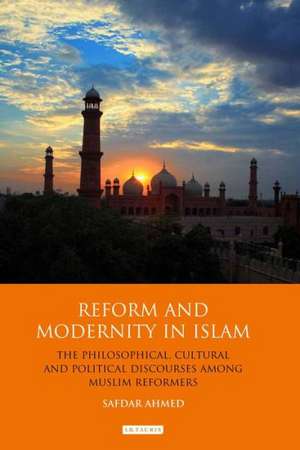Reform and Modernity in Islam: The Philosophical, Cultural and Political Discourses Among Muslim Reformers: LIBRARY OF MODERN RELIGION, cartea 26
Autor Safdar Ahmeden Limba Engleză Hardback – 24 iun 2013
Preț: 715.34 lei
Preț vechi: 1028.16 lei
-30% Nou
Puncte Express: 1073
Preț estimativ în valută:
136.92€ • 148.78$ • 115.09£
136.92€ • 148.78$ • 115.09£
Carte disponibilă
Livrare economică 31 martie-14 aprilie
Preluare comenzi: 021 569.72.76
Specificații
ISBN-13: 9781848857353
ISBN-10: 1848857357
Pagini: 296
Dimensiuni: 145 x 218 x 33 mm
Greutate: 0.52 kg
Editura: I. B. Tauris & Company
Seria LIBRARY OF MODERN RELIGION
ISBN-10: 1848857357
Pagini: 296
Dimensiuni: 145 x 218 x 33 mm
Greutate: 0.52 kg
Editura: I. B. Tauris & Company
Seria LIBRARY OF MODERN RELIGION
Notă biografică
Safdar Ahmed is a lecturer and tutor in the Department of Islamic and Arabic Studies at the University of Sydney, where he also obtained his PhD.
Cuprins
Chapter 1: Islamic Modernism and the Reification of Religion Chapter 2: Literary Romanticism and Islamic Modernity: The Case of Urdu Poetry Chapter 3: Education and the Status of Women Chapter 4: Muhammad Iqbal, Islam and Modern Nationalism Chapter 5: The Theory of Divine Sovereignty Chapter 6: Maududi and Gendering of Muslim Identity Chapter 7: Progressive Islam: The Hermeneutical Turn Conclusion
Recenzii
'This is an excellent and thought-provoking book on an important topic. Written withelegance and style, it presents a multi-layered analysis of hw Musli intellectuals have dealt with 'modernity'. It is at once a critical review of the ways in which conceptions of modernity, although developed in historically specific circumstances, are often conceived of today as a single ideology, and a subtle and informed interpretation of Islamic reformist thought of various kinds. It cogently argues that reformism cannot be understood without relating it to changing power relationships and evolving conceptualisations of religion, literature, gender and state.' James Piscatori, Professor of International Relations in the Schol of Government and International Affairs, Durham University.





